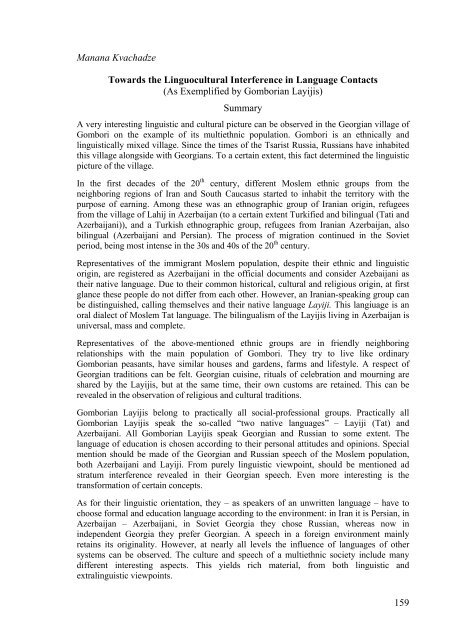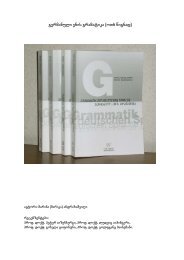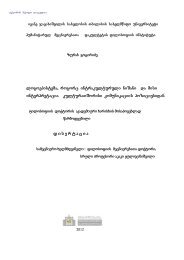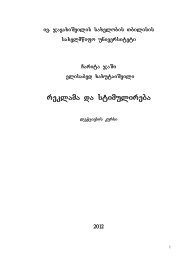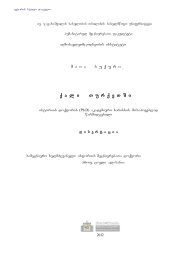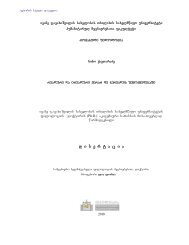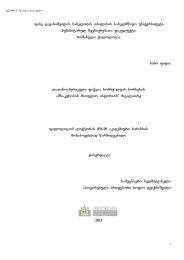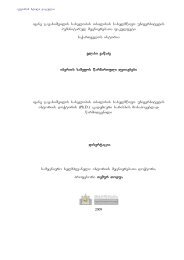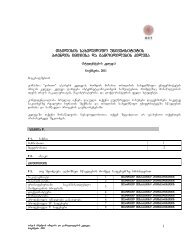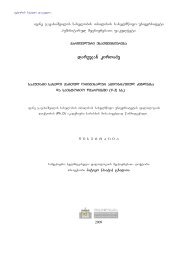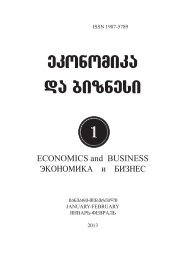issues of linguistics - Tbilisi State University
issues of linguistics - Tbilisi State University
issues of linguistics - Tbilisi State University
You also want an ePaper? Increase the reach of your titles
YUMPU automatically turns print PDFs into web optimized ePapers that Google loves.
Manana Kvachadze<br />
Towards the Linguocultural Interference in Language Contacts<br />
(As Exemplified by Gomborian Layijis)<br />
Summary<br />
A very interesting linguistic and cultural picture can be observed in the Georgian village <strong>of</strong><br />
Gombori on the example <strong>of</strong> its multiethnic population. Gombori is an ethnically and<br />
linguistically mixed village. Since the times <strong>of</strong> the Tsarist Russia, Russians have inhabited<br />
this village alongside with Georgians. To a certain extent, this fact determined the linguistic<br />
picture <strong>of</strong> the village.<br />
In the first decades <strong>of</strong> the 20 th century, different Moslem ethnic groups from the<br />
neighboring regions <strong>of</strong> Iran and South Caucasus started to inhabit the territory with the<br />
purpose <strong>of</strong> earning. Among these was an ethnographic group <strong>of</strong> Iranian origin, refugees<br />
from the village <strong>of</strong> Lahij in Azerbaijan (to a certain extent Turkified and bilingual (Tati and<br />
Azerbaijani)), and a Turkish ethnographic group, refugees from Iranian Azerbaijan, also<br />
bilingual (Azerbaijani and Persian). The process <strong>of</strong> migration continued in the Soviet<br />
period, being most intense in the 30s and 40s <strong>of</strong> the 20 th century.<br />
Representatives <strong>of</strong> the immigrant Moslem population, despite their ethnic and linguistic<br />
origin, are registered as Azerbaijani in the <strong>of</strong>ficial documents and consider Azebaijani as<br />
their native language. Due to their common historical, cultural and religious origin, at first<br />
glance these people do not differ from each other. However, an Iranian-speaking group can<br />
be distinguished, calling themselves and their native language Layiji. This langiuage is an<br />
oral dialect <strong>of</strong> Moslem Tat language. The bilingualism <strong>of</strong> the Layijis living in Azerbaijan is<br />
universal, mass and complete.<br />
Representatives <strong>of</strong> the above-mentioned ethnic groups are in friendly neighboring<br />
relationships with the main population <strong>of</strong> Gombori. They try to live like ordinary<br />
Gomborian peasants, have similar houses and gardens, farms and lifestyle. A respect <strong>of</strong><br />
Georgian traditions can be felt. Georgian cuisine, rituals <strong>of</strong> celebration and mourning are<br />
shared by the Layijis, but at the same time, their own customs are retained. This can be<br />
revealed in the observation <strong>of</strong> religious and cultural traditions.<br />
Gomborian Layijis belong to practically all social-pr<strong>of</strong>essional groups. Practically all<br />
Gomborian Layijis speak the so-called “two native languages” – Layiji (Tat) and<br />
Azerbaijani. All Gomborian Layijis speak Georgian and Russian to some extent. The<br />
language <strong>of</strong> education is chosen according to their personal attitudes and opinions. Special<br />
mention should be made <strong>of</strong> the Georgian and Russian speech <strong>of</strong> the Moslem population,<br />
both Azerbaijani and Layiji. From purely linguistic viewpoint, should be mentioned ad<br />
stratum interference revealed in their Georgian speech. Even more interesting is the<br />
transformation <strong>of</strong> certain concepts.<br />
As for their linguistic orientation, they – as speakers <strong>of</strong> an unwritten language – have to<br />
choose formal and education language according to the environment: in Iran it is Persian, in<br />
Azerbaijan – Azerbaijani, in Soviet Georgia they chose Russian, whereas now in<br />
independent Georgia they prefer Georgian. A speech in a foreign environment mainly<br />
retains its originality. However, at nearly all levels the influence <strong>of</strong> languages <strong>of</strong> other<br />
systems can be observed. The culture and speech <strong>of</strong> a multiethnic society include many<br />
different interesting aspects. This yields rich material, from both linguistic and<br />
extralinguistic viewpoints.<br />
159


